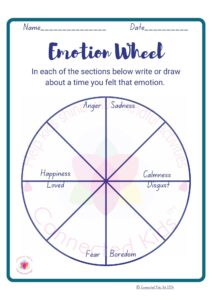Meditation to support the grieving process
Helping children through grief using meditation can be a powerful way to support young people at a time of enormous emotional change.
As adults we can still feel the emotional trigger of past grief, even if we think we have processed it and let it go.
Watching a young person go through the grieving process can be that trigger. Learning meditation to faciliate the grieving journey can help everyone access more balance and peace.
Assumptions about grief
We might assume that children don’t notice or feel grief – dismissing this possibilty as they are cognitvely “too young” and “don’t understand”. But we know from research that this isn’t true.
Or we might think they can connect and trust us to share how they feel, forgetting that finding the words and expressing these feelings can be overwhelming for young people and may play out in behaviour, rather than words.
Grief is not easy to discuss, so it can be helpful to use mindful and meditation skills to approach this.
This quote by Dr Colin Murray Parkes, a British psychiatrist and a pioneer in this field helps guide us to accept why we feel what we feel. This is an important, mindful step in helping young people on their journey with grief.
Mindful communication
We might think that this word ‘communication’ simply means we should explain what is happening and why the young person feels the way they do.
It can be quite the opposite. We train our qualified meditation teachers to sit and listen, with an open heart and the energy of acceptance. They gently guide young people to identify what they are noticing and how to use mindful skills to process this.
The ability to mindfully listen to young people can be deeply healing.
Adults are often tempted to step in and finish a sentence if a child is struggling to find the words. It’s understandable and in the course of their natural learning, it’s okay to do this.
But there are times when it is more healing to guide them to the answer or at least present them with a choice of feelings that they might be experiencing and letting them choose.
This creates a safe space for children to share.
Mindful communication allows adults to speak from their heart, with honesty. Teaching that young person, in a heartfelt way, that grief is difficult, challenging and lifelong and that we learn to live with it.
Facing feelings
Feelings are powerful and often when grief hurts, we don’t want to feel it.
We would rather distract or run away from the feelings, keeping busy and trying to ignore it. It’s a short-term coping mechanism, but not a long-term healthy option.
Vicki Harrison, Author
In order to help children process grief, we have to honour our feelings too. Meditation is a powerful tool in helping us acknowledge the thoughts and feelings with mindful tools that can assist and release the internal pressure in a healing way.
The simple act of naming and honouring can mindfully assist the grief journey.
It’s a powerful act of self compassion and self love. It can relax the body, the mind and the heart.
Placing a hand on the heart as we do this is a physical signal of this acceptance and can help calm the nervous system and lower stress.
Winnie the Pooh
Mindful tools
The meditation for grief video helps guide young people to meditate and process feelings of grief.
In our Meditation Hub we have similar recordings that are designed for different ages and attention spans to help with processing grief in children and teens.
Invite your young person to listen and perhaps it will inspire mindful commnication that can help everyone heal at this time. Helping young people navigate the journey of grief.
 A Wheel of Emotions practice can help children connect the body, thoughts and feelings to process grief.
A Wheel of Emotions practice can help children connect the body, thoughts and feelings to process grief.





